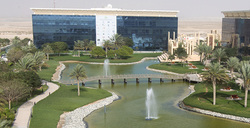 The International Humanitarian City in Dubai The International Humanitarian City in Dubai Today the Dutch will take on Mexico during the World Soccer Championship, a first step in the knock-out phase that will hopefully get the Orange team to the final in Rio. At the same time we realise that not only decisions on soccer are made in this part of the world. Mexico hosted the first High Level Meeting for Effective Development Cooperation in April which was partly a follow up to the Rio+20 conference and partly a follow-up to the Busan conference on aid effectiveness. The Global Partnership wants to help nations, business and organisations work better together to end poverty What happened in Mexico also aims to impact the consultations the UN has held in the past year around a new set of Sustainable Development Goals, leading up to this week's High Level Political Forum on Sustainable Development in New York. At the Mexican High Level Meeting the role of the private sector as provider for effective development processes was emphasized all over the place. The meeting was organized with a number of like-minded organizations and countries who consider the Private Sector as the next saviour of global development after the state has failed to deliver. At the end of the meeting in Mexico, the Dutch Minister for Aid and Trade, Mrs. Lilianne Ploumen, was offered the co-chair seat along with the Mexican Secretary of Foreign Affairs Mr. José Antonio Meade Kuribreña and the Nigerian Minister of Finance Ms. Ngozi Okonjo-Iweala. This weeks deliberations in New York of the Political Forum linked to the UN will tell us in how much the UN is willing to consider this role of the private sector. Last week one of my students shared this link to a story about the International Humanitarian infrastructure. Unfortunately the webpage is in Dutch. Hopefully google translate will help out. The pages describe the biggest humanitarian aid hub based in Dubai, known as the International Humanitarian City. A donation by Sheikh Mohamed Bin Rashid Al Maktoum, vice-president and prime minister of the United Arab Emirates and Ruler of Dubai. Just as he donates houses and other privileges to his citizens who naturally provide him all the public support he needs to stay in power. Almost all major humanitarian aid organisations (UN agencies and NGOs) have offices in this hub, and most humanitarian aid operations heavily rely on the logistical support from this hub. The question that comes to my mind is whether the world should embrace this kind of initiatives. In fact this is the biggest public-private-partnership you may think of. Questions may rise on how decisions on support are being taken. If the whole world puts their resources together, will it still be difficult to make individual choices on how to allocate funding and logistical support. Taking FIFA as an example. Everyone is enjoying the benefits of a tournament like the World Championships begin organised once in every four years. However, it is a public secret that the implementation of the event is left to a highly corrupt organisation lead by Mr. Sepp Blatter, who could be considered as one of the most powerful persons in the world. The recent scandal on how the organization of this event was awarded to Qatar shows how intertwined these dynamics are with something as political as humanitarian aid. Whatever Mrs. Ploumen may do in her capacity as co-chair for the Global Partnership for Effective Development Cooperation, it seems to me that the road towards transfer of responsibilities from the public to the private sector, often sold under the cover of social corporate responsibility will in the end not benefit everybody equally and will contribute to even more inequality. With the rich not only dominating the productive resource base (leasing large areas of productive soils in Africa) but also being in charge of the world's humanitarian aid, despite the noble intentions. With crises deepening priorities will be set by these powerful individuals and a deadly triage may take place at a global scale, with whole countries or continents left unattended. I would be in favour of contingency planning within countries and response capacity put in place in multiple hubs in the world, preferably managed by countries mostly affected by crises. However, I suppose the IHC is not only an act of charity but possibly a very clever strategy to maintain a dominant position in the global aid industry with supplies resourced in the Middle East. 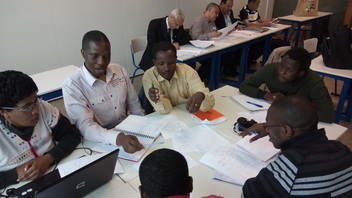 Real-Time stakeholder consultation at VHL Real-Time stakeholder consultation at VHL Recently a colleague at VHL reminded me that there is more to education than getting the competencies to students. As he knew I was teaching Bachelor students Disaster Recovery Management (DRM) he shared the situation of a partner university in the Balkan where education came to a stand-still. The floods of a month ago ruined the campus of the partner univeristy. At the time DRM students were spending time in rural Hungary for field work. We should have shifted the location a few miles. This situation illustrates that teaching Disaster Recovery Management in the Netherlands in one sense is a luxury position having all the educational support at hand and in another sense it is often 'swimming-on-the-shore'. As a lecturer I just have to live with the fact that I do not have recovery situations at hand to connect learning and practice. In their second year these students will be allowed to spend two months with an organisation engaged in disaster recovery. And a longer placement period in the third year hopefully offers them some practical experience. Battle of Ideas Unlike the Bachelors education the Professional masters education we are providing for practitioners offers ample opportunity to engage. This week I enjoyed doing the facilitation of a module on Project Cycle Management where we did a Real-Time project identification with a group of stakeholders linked to a Centre of Excellence in Farmer Field Schools in Egypt in the context of a Nuffic project. The Egyptians had the benefit of picking the brains of our bright international students for bringing innovative ideas to the Centre. Both a Dean from Agricultural Faculty of Fayoum University and the Undersecretary of Fayoum Agricultural Department were present in the classroom. They were consulted by a group of agricultural experts from Rwanda, Zimbabwe, Ghana, Nigeria and Ethiopia (students from the Management of Development who signed up for the capita selecta PCM). Both groups loved the interaction. A great way to combine theory and practice at VHL University. Students may consider to submit one of these proposals to the Battle of Ideas of NWO-WOTRO next week. The Egyptians could try the Facility for Sustainable Entrepreneurship of which the second round was launched this week. We only need to resource a food or seed company to partner with us. "I believe that in the short run, within 2014, the floods will have a downward impact on growth (...) Overall we can have very cautious optimism and if reforms are pursued and with recovery from the floods, I think we can expect to see a positive growth trajectory and job creation coming forward." 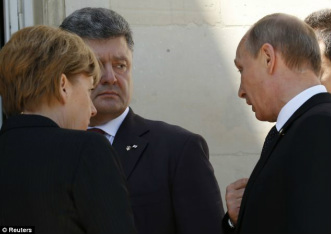 Merkel connecting Putin and Poroshenko (source: Reuters) Merkel connecting Putin and Poroshenko (source: Reuters) No one understood the significance of the commemoration of D-day better than Francois Hollande and Angela Merkel. In what probably will be remembered as the speech of his lifetime President Hollande of France managed to bring the significance of the event for present day geo-politics to the surface. Merkel did what nobody else could do, bridge Russia and Ukraine. Trying hard to find Hollande's speech I tried in vain the day after the event. That this footage was not available right after the event may quite well be a result of the previous row about the live broadcasting rights as the Guardian reported days before the event.* Searching for Obama's address I immediately hit home. It seems to me that other world leaders were not so pleased with the French presidents performance during the live broadcast that went all over the world. They were merely figurants at the ceremony that commemorated D-Day and clearly had a French host. It seems some corrective measures were taken afterwards with almost no coverage to be found on the internet of the speech of Hollande*. Like in big conferences, several side-events went on to allow all dignatories to give themselves a 'stage'. The French host nation was dispersed joining several events simultaneously. These coverages can be found all over the place in various national news channels. And what Russia Today reported on was Obama's eye warfare with Putin. Future will tell us whether Hollande and Merkel possibly saved the world from a third World War as both ably manouvred the stage showing great diplomatic skills and geo-political sensitivity. Behind the scenes Putin and Obama exchanged a few words, though I had the impression that the initiative of the American President was not much appreciated by his Russian counterpart., which I can imagine given the first performance on stage. Mrs. Merkel did much better instead, getting Russia and Ukraine to talk to each other on stage. Possibly the best thing she could do in what also has been referred to as D-Day Diplomacy. *) The speech of Hollande and the full broadcast of the day can be found at C-SPAN President Obama and President Putin making eye contact and Obama turning Putin his back. Not the best bid at D-day.
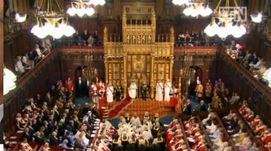 Wednesday, June 4, 2014 For many on the European mainland it may just be the best opportunity to see some Royal Folklore, few realize that the British Empire still exists in many ways and distant nations may listen with more interest to the Queen's Speech than British citizens. Well, they were listening in vain hoping for a glimpse of support to international rule of law, apart from hosting a NATO conference. It was of course the day of David Cameron if not of George Osborne, the strategist behind the British treasury, setting out the plans for their final year in office. Bearing that in mind the only relevant remark made was the reference to an updated charter for budget reponsibility (already presented in March) that should ensure that future governments would spend tax-payers money responsible. A new and independent Office of Budget Responsibility will be staffed with good old friends I suppose, ensuring that any labour or populist-government would continue to walk the liberal fiscal path set-out by Osborne, keeping his legacy alive. Domestic It was mainly a domestic agenda that featured in the Queens Speech. No mention of a global race – competing alongside new centres of enterprise around the world for investment and jobs that can move anywhere, like in Osborne's 2013 budget speech. The rest of the world only featured in the climate change agenda and some geopolitical considerations around Ukraine and Russia. No reference to global inequality figures, despite the strive for a fairer society at home. That reference should not be taken too serious though, as those that work hard should continue to reap the benefits of their labour, as if having work is not a priviledge. In that regard the reference to the prevention of modern slavery and human trafficking may also be read differently. It could refer to modern slavery at home rather than far away. And the concern about trafficking probably refers to the trafficked indidviduals that have already ended-up in these 'jobs'. That trafficking is a global phenomenon and may require global solutions is not necessarily considered. Also support for military engagement in other countries to protect international human rights is dwindling. Syria is only refered to as a humanitarian situation. Afghanistan is in the picture due to some past commitments that the UK wants to get rid of in a fashionable way. The third reference to foreign policy concerned the comprehensive nuclear agreement with Iran. I wonder whose nuclear program will benefit from a comparative advantage afterwards. It seems all other foreign policy is left to the market. It is rather silent economic diplomacy that is practiced by Brittain in Brittain, unlike in the Netherlands where we aim to be transparent in these things, with no one questioning Hosting the financial controls of those markets in London should do I suppose. Safe place The Queen's speech clearly indicated that those with posessions should feel safe in the UK, including their families. The UK already is host to the worlds' top financial businesses partners. Prince Charles recently hosted a high-level conference on inclusive capitalism. Mr. Osborne in turn promises the Welch people to benefit a bit more from their presence, still believing in the ever living myth of trickling down. Will the City be allowed for a reboot of the system as the doctrine of inclusive capitalism seems to prescribe? The systemic change that is required may not necessarily be in the interest of the current global elite. Finally, the freedom of labour that has been encouraged has contributed to a rise in self-employed uninsured individuals. The National Insurance schemes will need to be able to tap into this new market segment. Hence, legislation will be introduced for just doing that. In other words: the City should not worry as taxes and interests remain low. However, startups should pay for social service delivery by contributing to national insurance schemes. "Other measures will be laid before you..." Queen Elisabeth |
About meMy name is Reinier van Hoffen. U®Reading
Click here for a summary.
Also find the text of a lecture Dr. Achterhuis held at the 2012 Bilderberg conference. Archives
August 2022
|
AddressNachtegaallaan 26
Ede, the Netherlands |
Telephone+31 (0)6 1429 1569
|
info@uraide.nl
|
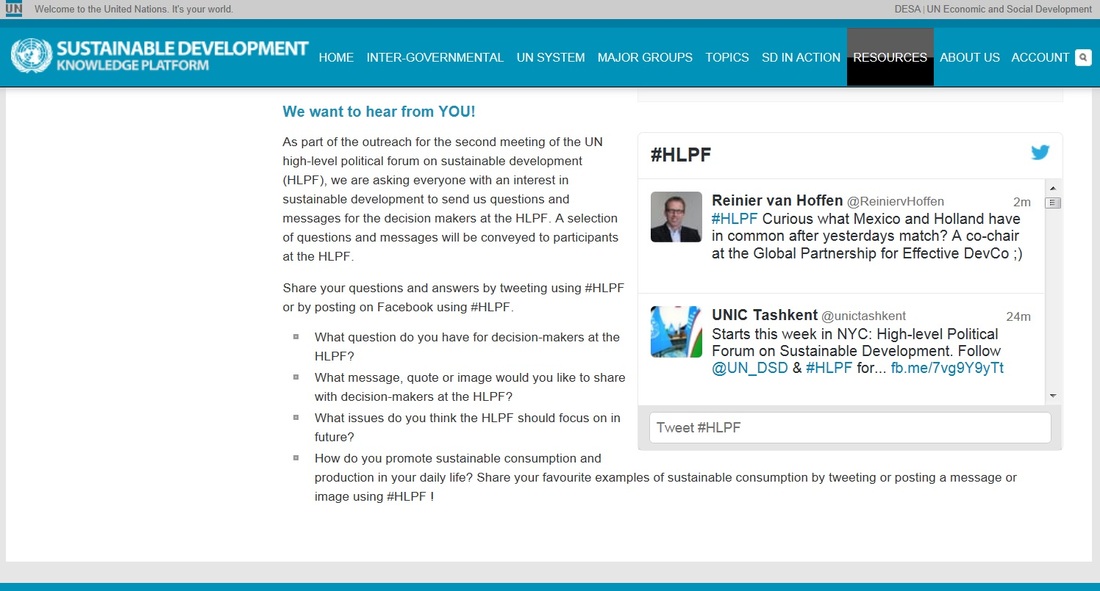
 RSS Feed
RSS Feed
















